PostTime:5/8/2025
This summer, the Class of 2025 will graduate from Guangdong Technion – Israel Institute of Technology (GTIIT), carrying with them the wisdom and courage forged in university to embrace infinite possibilities. At GTIIT, they have persevered through challenges brought by the pandemic, conquered academic puzzles, broadened international horizons, celebrated cultural richness, and discovered their true passions, showcasing the exemplary spirit of "Dream it. Do it." through each innovative practice.
GTIIT will launch a series of interviews featuring the Class of 2025 undergraduates. Let's delve into these powerful stories of passion and perseverance, and witness how their defining moments of efforts blossom into fruition.
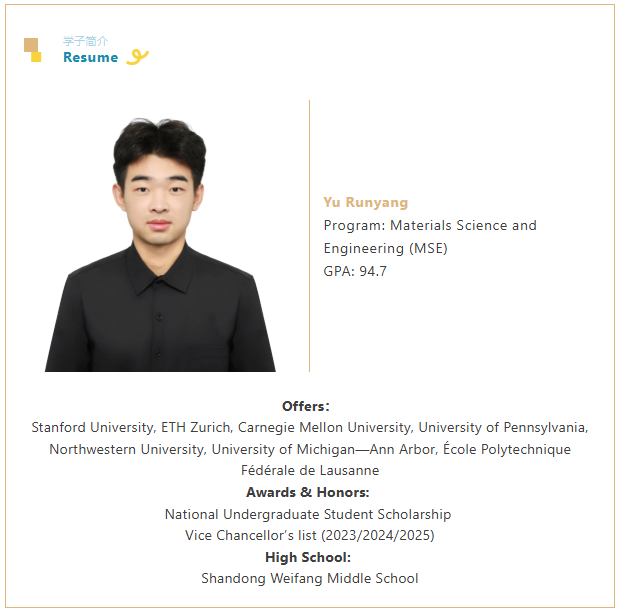
Back in fall 2021, when Runyang entered GTIIT with a score just meeting GTIIT's cutoff line in Shandong Province, he was filled with so much feeling—part relieved, part frustrated, with some anticipation. Four years later, this once "last-admitted student" has scripted a remarkable counterattack story—achieving the highest GPA in his major, and holding an admission letter from Stanford University.
The secret to success:“slow birds must fly early”
Before joining GTIIT, Runyang knew this university was his perfect match. Back in 2021, a random admissions event introduced him to this STEM-focused international university—and for a student who struggled with liberal arts but aced math and chemistry, a goal was set since then. "I wanted in so bad. Even though my Gaokao score was just 4 points above the special control line, I put GTIIT as my top choice. Just give it a shot."
Luckily, he was admitted by GTIIT that year and stepped onto campus as a MSE student. The story of "self-reinvention" began since then.
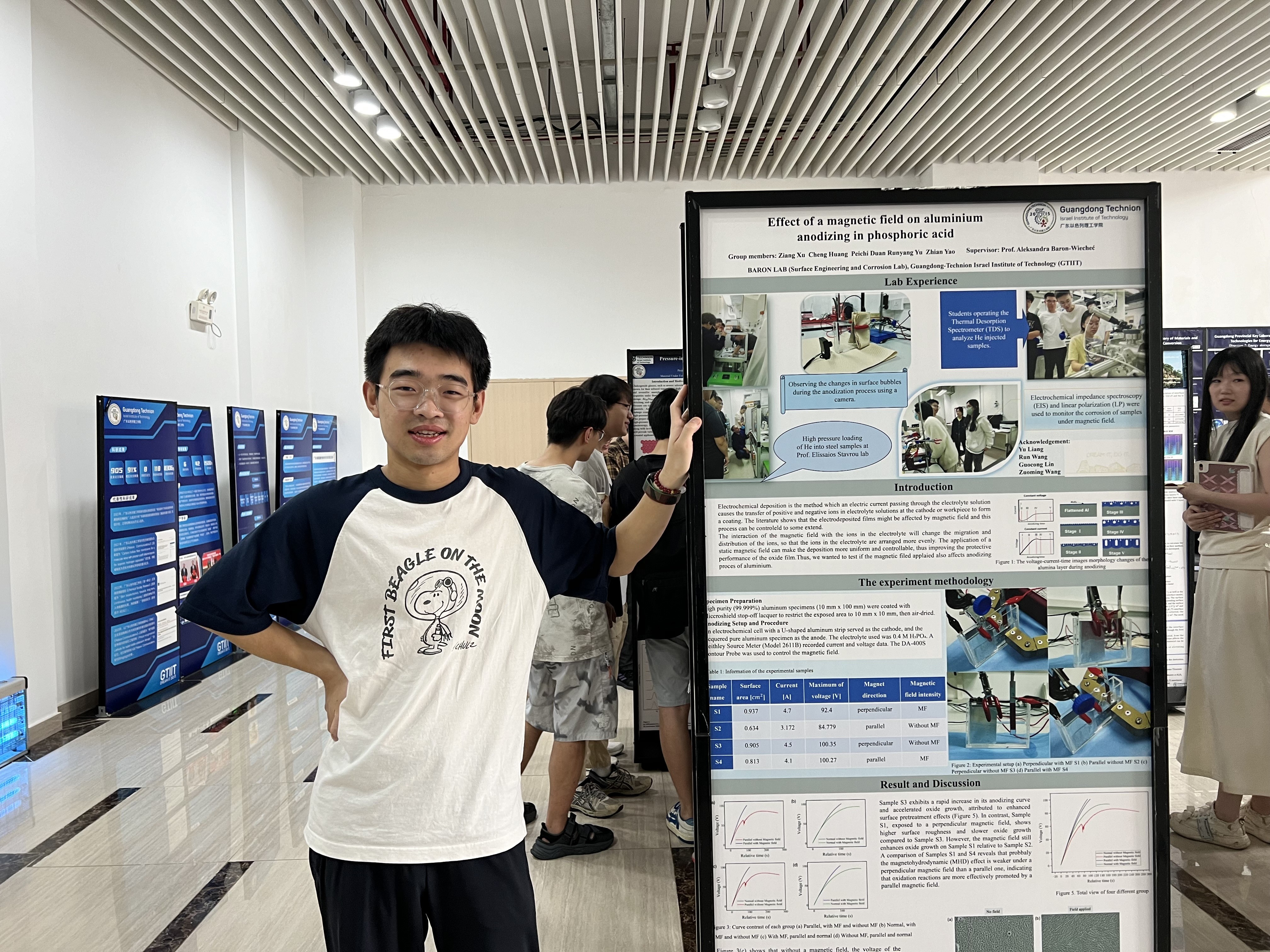
English immersion hit Runyang hard—his old "vocabulary cramming" tactics no longer worked. Real understanding became the only way to turn grades around. "Slow birds must fly early," he admitted. "When you realize you're not gifted but still want to excel, preparation is your only way. Most things turn out decent if you put effort to prepare. My method is to preview first—truly grasp the concepts before class, then reinforce through lectures. Make sure that you keep pace with the professors."
Beyond dedicating 25% of his energy to previewing, a brutal study intensity almost defined his entire university life. Study, eat, class. Study, eat, class. "My friends called me a 'human robot'," he smiled. "That was basically how I spent the first three years."
When stress levels went up, he made a conscious effort to avoid self-doubt. "To do something well, you need to adjust your mindset, have a clear understanding of yourself, and then take action quickly—good execution is key. Staying busy keeps negative thoughts at bay." In the first semester of his sophomore year, when tough quantum chemistry classes and challenging physics lab reports piled up, he encouraged himself: "Achieving 100 may be hard, but 80 is within reach!" Sticking to his meticulous study plan, he put relentless focus to master every concept, always holding onto one belief: “If you truly put in the time and effort, the results won’t disappoint you.”
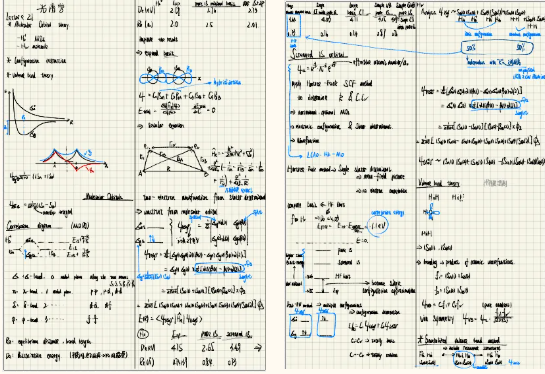
Runyang's notes on quantum chemistry
Relentless discipline came with stellar results: He aced quantum chemistry with a 96 score, and his overall grades improved from around 70+ in the preparatory semester to over 94, eventually becoming the top student in his major.
Research Exploration: start early, stay committed
Ever since watching a documentary about a heroic pilot's emergency landing as a child, Runyang developed a fascination with materials science. "That flight to Hawaii had its metal structure fail because of the humid environment, eventually causing the plane's body to tear apart," he explained. "That's when I realized how amazing materials are—I knew I wanted to learn it."
As he grew older, everyday things made him curious: "Why do golf balls have dimples instead of being smooth? In wind tunnel tests, how do different shapes cause significant variations in airflow velocity and pressure distribution? What really causes metal to corrode?" This practical field of study fed his curiosity and led him into scientific research.
In his first summer at GTIIT, eager to get into research early, he joined Associate Professor Xie Zuoti’s lab team. There, he got his first hands-on experience with the full research process—from literature review and experimental design to data analysis. It was in the world of molecular electronics that he truly saw how research works.
In his sophomore year, Runyang met Assoc. Prof. Aleksandra Baron-Wiechec and later joined her research group. The Polish scholar, who often guided students through thought-provoking questions, became another mentor on his research journey.
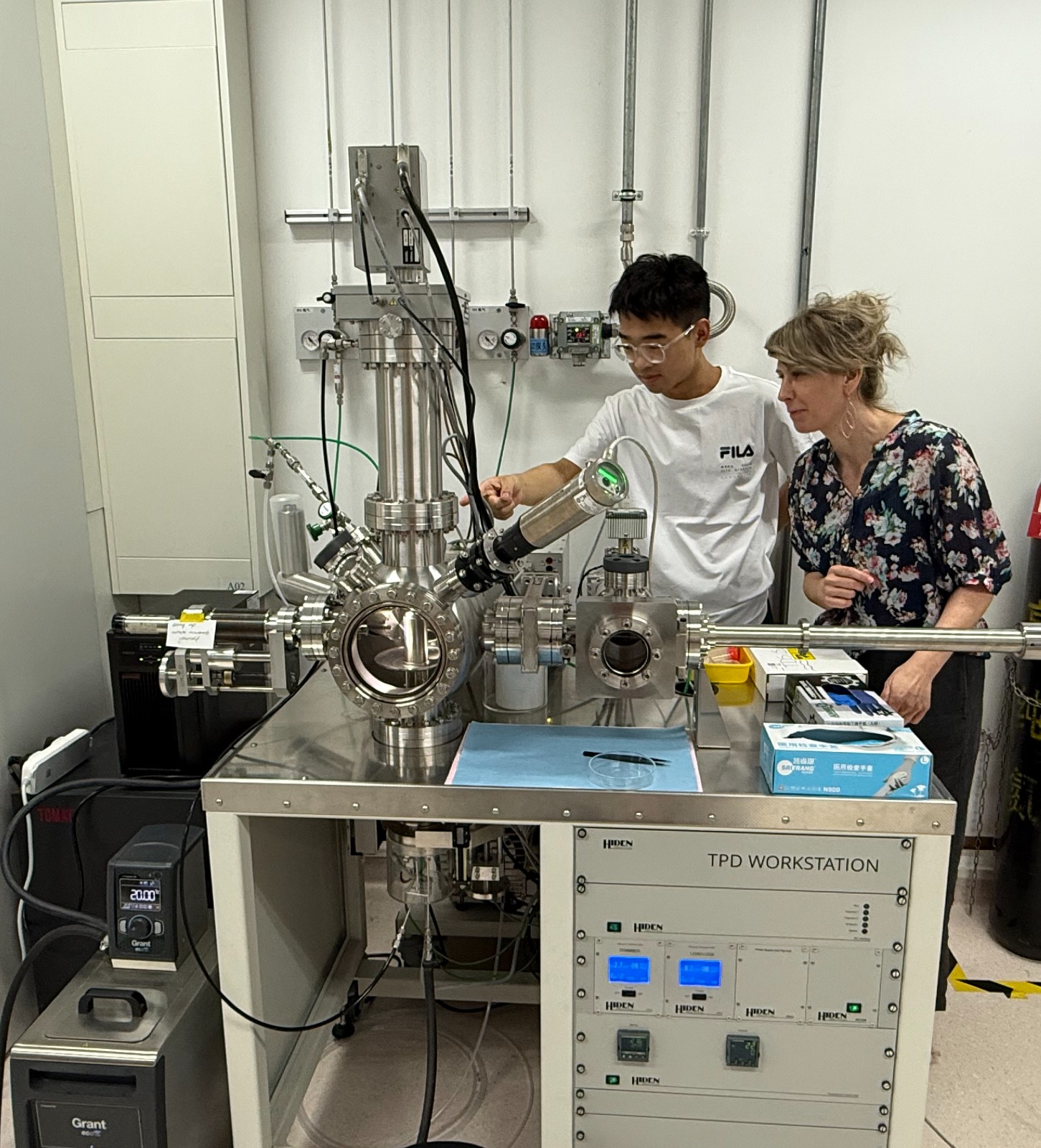
Runyang and Assoc. Prof. Wiechec

"She was incredibly patient—she'd give us detailed lab tours and always noticed when students had questions, actively engaging with us," he recalled. Beyond careful guidance, the professor also knew when to "let go," giving students space to explore research topics independently. "Tackling a project on your own is completely different from following a mentor. You have to figure out how to design the study, anticipate problems, and plan each step," he admitted. Though he wasn't fully satisfied with his final results, he added, "I'm really grateful for this opportunity. It made me realize that real research comes with unexpected challenges—it takes persistent effort and isn't as straightforward as I'd imagined."
He also highlighted the invaluable guidance from senior lab members. "I’m truly thankful to Wang Zuoming, a senior from the class of 2019, and Yu Yongxin, a senior from the class of 2020, who taught me everything they knew—guiding me step-by-step through every experimental procedure. Their help was crucial for me."
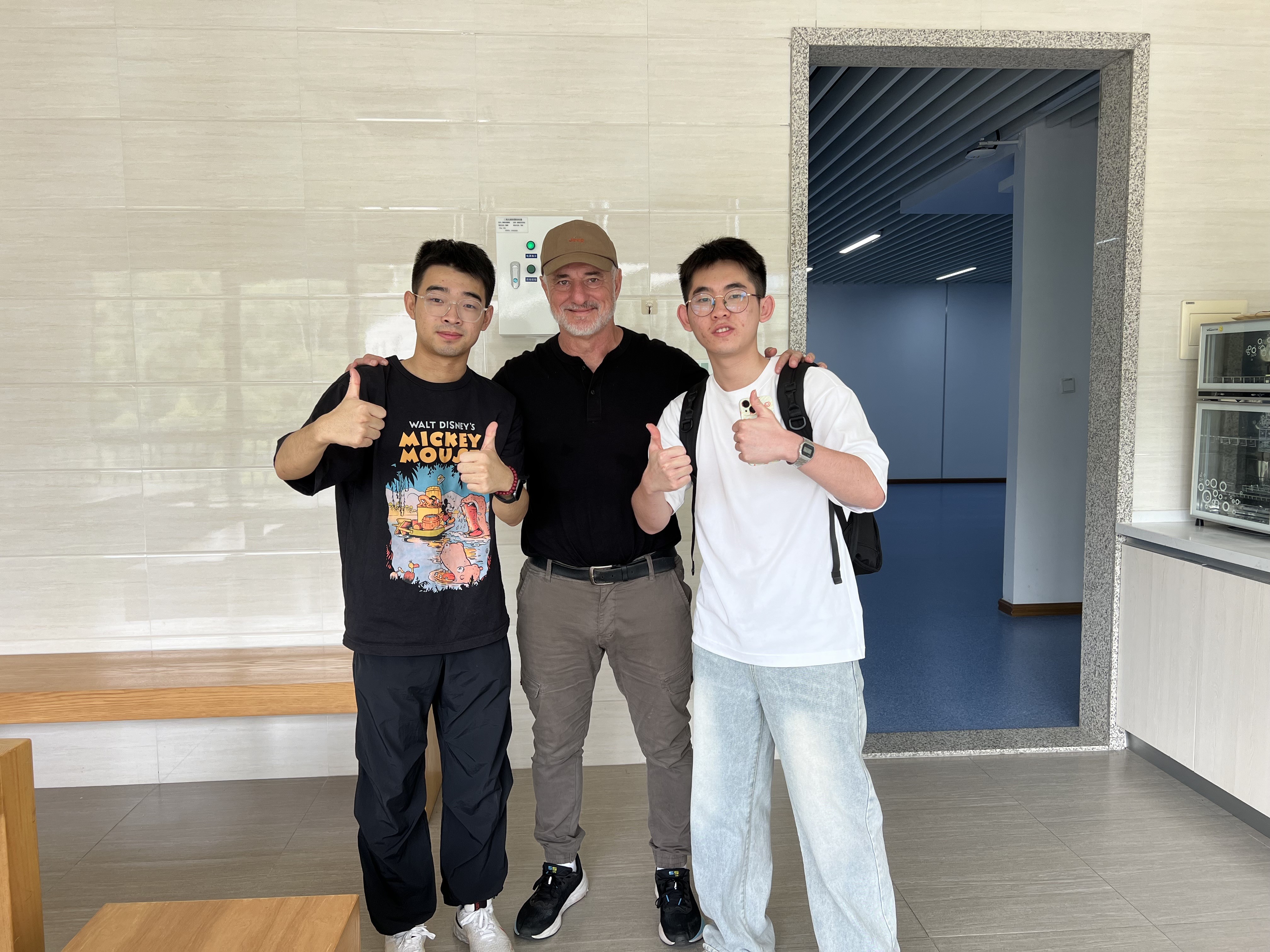
Runyang with GTIIT teaching supervisor
In this supportive team, he grew quickly. "In engineering, persistence pays off—keep practicing, keep working, and you’ll see progress." Starting with basic electrochemical corrosion curve measurements, he progressed to mastering Tafel curve analysis and eventually operating a mass spectrometer independently to analyze material composition. Through this hands-on training, he built a solid foundation in research. These more than two years of practical experience also played a key role in securing his admission to the Stanford program.
Looking Back on GTIIT: thanks, thanks, thanks
During the interview, he expressed gratitude over a dozen times, saying, "I’ve received so much help at GTIIT." In his eyes, the small campus fosters a tight-knit academic community. "At other schools, you might meet different people every day. But GTIIT is a smaller group—everyone knows each other and is willing to help, like living in a close neighborhood where you bump into familiar faces. It feels warm and welcoming."
This open and supportive learning environment opened himself more: "I became more confident and even more 'extroverted'." Besides, the professors’ seemingly "bottomless" patience sharpened his questioning skills: "Even if you ask a question three times, they’ll still explain it. By the fourth or fifth time, they might say, ‘Let’s talk after class—you can come to me privately.’" From professors to senior students, from CLC courses to the global alumni network, whenever he faced a tough problem, he would ask away, fully leveraging institutional resources to bridge information gaps. "I just ask everyone—anyone who can help. Usually over meals, in a very ‘Shandong’ way," he smiled.

His humble approach to learning stems from his unique perspective on growth: "If you rate a person, their true ability is the numerator, and how much they show off is the denominator. The more you boast, the bigger the denominator gets, lowering your overall score. But if you stay humble and seek guidance, your score rises."
"Once you’ve studied at GTIIT, you’re part of the GTIIT family." Beyond academics, he serves as a peer tutor and mentor, guiding freshmen and sharing his experiences at admissions events to help parents with their concerns—passing on the support he received.
Looking ahead, he hopes to dive deeper into research during his master’s to decide if a Ph.D. suits him. "Real research isn’t easy. My results came from hard work and time, but a Ph.D. might be different." With this mindset, he’ll spend the next two years exploring, until finding his true passion.
Text: GTIIT News & Public Affairs
Photos: provided by Yu Runyang
© GUANGDONG TECHNION-ISRAEL INSTITUTE OF TECHNOLOGY | 粤ICP备17036470号
